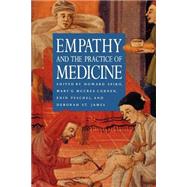Empathy and the Practice of Medicine
, by Spiro, Howard M.; Curnen, Mary G. McCrea; Peschel, Enid; St. James, Deborah- ISBN: 9780300066708 | 0300066708
- Cover: Paperback
- Copyright: 3/1/1996
This important book seeks to restore empathy to medical practice: to demonstrate how important it is for doctors to listen to their patients and to experience and understand what their patients are feeling. The treatment of medical illness today depends much more on science and technology than on the physician's ability to listen, comfort, and prescribe. Medicine is not only increasingly technical but also increasingly involved with legal, governmental, and insurance constraints on patient care, and this state of affairs has done much to distance physicians from their patients. The book - which includes essays by physicians, philosophers, and a nurse - is divided into three parts: one deals with how empathy is weakened or lost during the course of medical education and suggests how to remedy this; another describes the historical and philosophical origins of empathy and provides arguments for and against it; and a third section offers compelling accounts of how physicians' empathy for their patients has affected their own lives and the lives of those in their care. We hear, for example, from a physician working in a hospice who relates the ways that the staff try to listen and respond to the needs of the dying; a scientist who interviews candidates for medical school and tells how qualities of empathy are undervalued by selection committees; a nurse who considers what nursing can teach physicians about empathy; another physician who ponders whether the desire to be empathic can hinder the detachment necessary for objective care; and several contributors who show how literature and art can help physicians to develop empathy. Medicine, assert most of these authors, is both science andnarrative, reason and intuition. Empathy underlies the qualities of the humanistic physician and must frame the skills of all professionals who care for patients.






